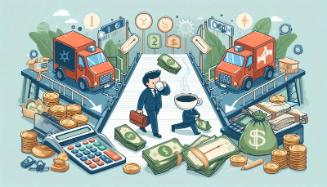How Inflation Will Impact the Economy in 2025 – What to Expect
Inflation remains a key economic concern in 2025, affecting consumer spending, business growth, and investment markets. Learn how rising prices and central bank policies could impact your daily life and financial future.
Inflation continues to shape the economy in 2025. Discover its impact on prices, wages, investments, and how to protect your financial future.
Introduction – The Ongoing Inflation Debate
Inflation has been a major topic of discussion in recent years, and 2025 is no exception. While central banks have implemented policies to control rising prices, consumers and businesses continue to feel the effects of inflation. But will inflation remain high, or is relief on the way?
What’s Driving Inflation in 2025?
Several factors contribute to ongoing inflationary pressures:
- Supply chain disruptions: Delays in manufacturing and transportation still impact global markets.
- Energy prices: Fluctuations in oil and gas prices drive up costs for businesses and consumers.
- Labor shortages: A tight job market leads to higher wages, which businesses pass on to consumers.
- Geopolitical tensions: Trade restrictions and conflicts affect commodity prices and supply availability.
How Inflation Affects Everyday Expenses
Rising prices impact various aspects of daily life, including:
- Food & groceries: Consumers pay more for basic necessities as supply chain issues persist.
- Housing & rent: Mortgage rates and rental prices increase due to inflation-driven interest rate hikes.
- Healthcare costs: Medical expenses rise, making insurance and out-of-pocket costs higher.
- Transportation & gas: Fuel prices fluctuate, affecting commuting and travel expenses.
The Role of Central Banks in Controlling Inflation
To combat inflation, central banks implement policies such as:
- Raising interest rates: Higher borrowing costs reduce consumer spending and slow price increases.
- Quantitative tightening: Reducing money supply helps stabilize economic conditions.
- Monitoring employment trends: A strong job market can influence wage-driven inflation.
How Inflation Affects the Stock Market
Inflation impacts investments in various ways:
- Volatile stock prices: Uncertainty about inflation leads to market fluctuations.
- Tech sector struggles: Rising interest rates make it harder for growth stocks to thrive.
- Defensive stocks gain traction: Consumer staples and healthcare stocks perform better in inflationary environments.
How Inflation Affects Savings & Investments
Inflation erodes the purchasing power of money, making it essential to adjust investment strategies:
- High-yield savings accounts: These accounts help offset inflation's impact.
- Investing in real assets: Real estate, commodities, and inflation-protected securities (TIPS) provide protection.
- Diversification: Spreading investments across different asset classes reduces risk.
Will Inflation Decrease in 2025?
While some economists predict inflation will slow, others warn that persistent price pressures could continue. Key factors influencing future inflation include:
- Monetary policy adjustments – Central banks' ability to balance inflation and economic growth.
- Geopolitical stability – The resolution of trade conflicts and supply chain recovery.
- Consumer demand trends – Spending behavior in response to rising costs.
How to Protect Your Finances from Inflation
To safeguard your wealth during inflationary periods:
- Increase your income: Look for side hustles or career advancement opportunities.
- Reduce unnecessary debt: High-interest loans become more expensive during inflationary periods.
- Invest in inflation-resistant assets: Consider commodities, gold, and real estate.
- Budget wisely: Adjust spending habits to account for rising costs.
Preparing for an Inflationary Future
While inflation remains a challenge, individuals can take proactive steps to manage their finances. By staying informed, adjusting investment strategies, and making smart spending decisions, it’s possible to navigate the impact of rising prices in 2025 and beyond.








